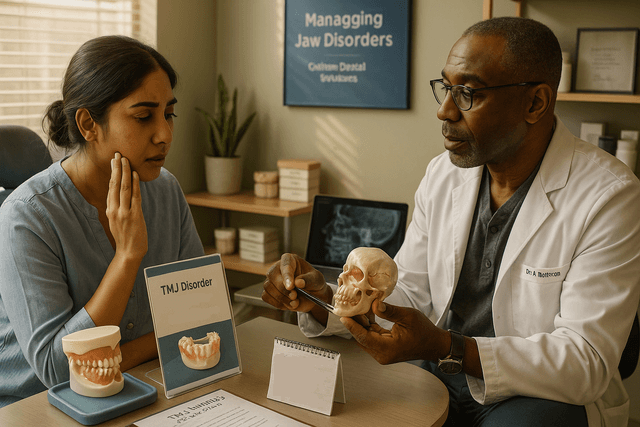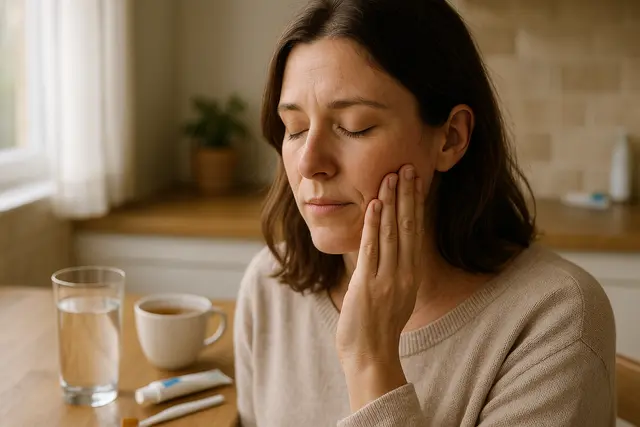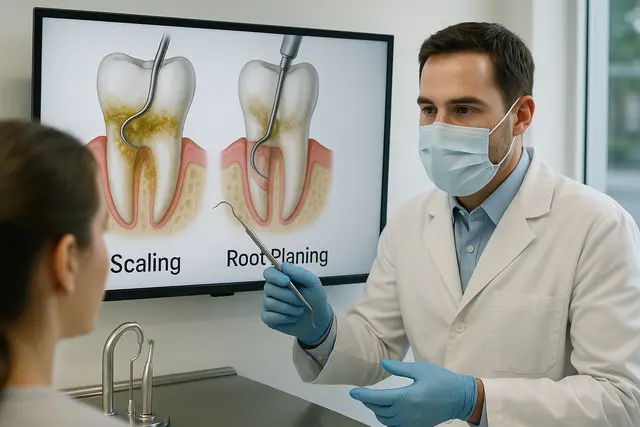General Dentistry
5 min read
Sep 05, 2025
Can a Dentist Fix TMJ? Expert Insights on Managing Jaw Disorders
TMJ disorders can turn everyday actions like chewing, talking, or even yawning into painful experiences. While many people associate dental visits with teeth and gums, your dentist may also be the key to diagnosing and managing jaw-related issues like TMJ.

If your jaw clicks, pops, locks, or just hurts like it's holding a grudge, you might be dealing with something called TMJ. And yes, a dentist can help. Actually, a general dentist may be one of your best bets when it comes to managing temporomandibular joint (TMJ) disorders. Let's break down what TMJ really is, why it causes pain, and how dental professionals can come to the rescue.
TMJ and Why Your Jaw Is Complaining
TMJ stands for temporomandibular joint, which is the fancy name for the hinge that connects your jaw to the side of your head. You have one on each side, and they help you talk, chew, yawn, and even clench your teeth when someone cuts you off in traffic.
TMJ disorder affects the jaw joint and muscles that control jaw movement. When things go wrong with this joint, you may experience symptoms like clicking, locking, pain, or tenderness in the jaw area. The causes? Oh, take your pick: injury to the jaw, arthritis, misaligned teeth, stress, or simply clenching or grinding your teeth (thanks, life).
What a Dentist Can Do for TMJ Disorder
So, can a dentist fix TMJ? Short answer: they can treat TMJ pain a few different ways. A general dentist who understands how the jaw functions and jaw movement can diagnose and treat many types of TMJ disorders. And no, it doesn’t always mean surgery or scary stuff.
A dentist can diagnose the issue based on your symptoms, jaw movement, and dental history. They may recommend imaging or refer you to a dental professional who specializes in orofacial pain or temporomandibular disorders if needed. But often, your regular general dentist is fully equipped to offer a solid treatment plan.
Understanding TMJ Pain and What Causes It
The pain and discomfort from TMJ disorder can range from mild to "please make it stop." TMJ pain can get worse with stress, chewing tough foods, or clenching and grinding (aka bruxism). You might feel it in your jaw joint, the side of your head, or even the side of your face.
Conditions that cause pain in the temporomandibular joint can be mechanical (like a bad bite), muscular (tight jaw muscles), or inflammatory (hello, arthritis). Some patients may experience acute pain from recent trauma, while others deal with chronic facial pain over time.
Suffering From TMJ Pain Doesn’t Have to Be a Life Sentence
If you’re suffering from TMJ pain, the good news is that it can usually be treated and managed without major drama. Most TMJ patients won’t need surgery or extreme measures. With the right treatment plan, many patients see improvement fairly quickly.
A dentist may recommend a custom dental appliance, like a night guard, to help reduce pressure on the joint. These devices can ease pain caused by clenching or grinding their teeth during sleep.
TMJ Treatment Starts with the Right Diagnosis
Diagnosis and treatment of TMJ often begins with a conversation. Your dentist explains what might be going on, asks about your symptoms of TMJ disorders, and checks how your jaw functions. From there, it’s all about figuring out the type of TMJ disorder you’re dealing with and tailoring a plan that fits.
Some TMJ symptoms may point to muscular issues, while others may suggest joint problems or inflammation. Either way, a dental professional can steer you in the right direction. Different dental appointments might be necessary depending on the complexity.
Common Treatment Options a Dentist May Recommend
Once diagnosed with TMJ, your dentist may recommend a few treatment options depending on severity. Common treatment options include:
Custom dental appliances: These are often used to prevent clenching or grinding.
Pain relievers or anti-inflammatories: Sometimes, over-the-counter meds work, but a dentist can prescribe stronger pain meds if needed.
Botulinum toxin type injections: This isn’t just for wrinkles anymore. It can relax overactive jaw muscles, often administered by oral surgeons.
Relaxation techniques: Stress management, meditation, or even jaw exercises to stretch and strengthen the muscles.
Transcutaneous electrical nerve stimulation (TENS): Fancy word, but it helps reduce pain through gentle electrical stimulation.
Physical therapy: Great for improving jaw movement and reducing tenderness.
Considering TMJ Treatment? Here's What to Expect
Treating TMJ isn’t usually a one-and-done deal. The treatment process may take a few weeks or months, depending on how severe your symptoms are. The goal is to relieve pain, improve jaw movement, and get you back to living without pain.
Your dentist can treat mild to moderate TMJ disorders right in their office. But for more complex cases, they might bring in a specialist, like a TMJ-focused oral surgeon or a dentist trained in orofacial pain.
Temporomandibular Disorders and the Bigger Picture
Temporomandibular joint disorder isn’t just about the joint. It can impact how you eat, talk, and sleep. Patients who have been diagnosed with TMJ might also notice headaches, neck aches, or that fun sensation of their jaw locking mid-sentence.
Temporomandibular disorders can sneak into your life quietly, but the sooner you catch it, the easier it is to treat. That’s why regular visits to a general dentist matter. Your teeth will often benefit from wearing a night guard if you clench, and your jaw joints will thank you too, a key aspect of maintaining long-term oral wellness.
Find Out More About TMJ Before It Gets Worse
Still have questions about TMJ? You're not alone. TMJ symptoms can be confusing, and it's easy to assume the issue is something else. If you've been experiencing jaw pain, popping sounds, or tenderness in the jaw, it's worth asking your dentist about it.
They can help patients identify whether it’s truly TMJ or another dental issue. Without treatment, TMJ can worsen over time and lead to more severe pain.
When a Dentist Can Treat TMJ and When to See a Specialist
A general dentist can treat most TMJ issues with non-invasive solutions. However, if symptoms get worse or aren’t responding to care, a referral to a TMJ specialist might be needed. These dentists are experts in the jaw joint and muscles that control jaw functions and can therefore offer more advanced solutions, like arthroscopic surgery if necessary.
The American Dental Association also supports dentists in helping with TMJ management and emphasizes the importance of conservative, reversible treatments first.
Don’t Wait for the Pain to Get Worse
TMJ pain can sneak up on you, but that doesn’t mean it has to stick around. Patients who are suffering from TMJ pain should know there are ways to relieve pain and improve quality of life. Whether it's a custom dental appliance, relaxation techniques, or a simple chat with your dentist, taking that first step matters.
If you're considering TMJ treatment, or even if you're just noticing early signs like clicking or mild jaw pain, don’t wait. Get more information, ask your general dentist, and take back control of your jaw.
Can a Dentist Really Fix TMJ?
Yes, many general dentists are trained to diagnose and treat TMJ disorders. They can evaluate your bite, jaw movement, and symptoms to determine whether your pain is caused by muscular tension, joint inflammation, or misalignment. In most cases, dentists provide conservative treatments such as custom night guards, medication, or lifestyle recommendations. For complex or severe cases, they may refer you to a specialist in orofacial pain or oral surgery.
What Are the Most Common Symptoms of TMJ Disorders?
TMJ disorders can cause a wide range of symptoms beyond jaw pain. Common signs include clicking or popping noises when you open or close your mouth, difficulty chewing, a jaw that locks in place, headaches, earaches, and facial tenderness. Stress-related behaviors such as clenching and grinding teeth (bruxism) can make these symptoms worse. Identifying these early signs with your dentist can help prevent the condition from worsening.
What Treatment Options Do Dentists Offer for TMJ Pain?
Dentists typically start with conservative, non-invasive options. Custom dental appliances like night guards reduce stress on the joint by preventing teeth grinding. Over-the-counter or prescribed anti-inflammatory medications can ease pain. Some dentists may recommend jaw exercises, relaxation techniques, or even physical therapy. In specific cases, treatments like botulinum toxin injections or TENS therapy may also be offered to relieve muscle tension. Surgery is considered only when other approaches fail.
When Should I See a Specialist Instead of My General Dentist?
If your TMJ symptoms are persistent, worsening, or unresponsive to standard treatments, your general dentist may recommend seeing a TMJ specialist or oral surgeon. Specialists can provide advanced therapies such as arthroscopy or reconstructive procedures if needed. You should also consider seeing a specialist if your TMJ pain is linked with arthritis, severe trauma, or frequent jaw locking that interferes with daily life. Early intervention helps ensure the best outcomes.
Read Next
Related Posts

General Dentistry
How to Stop Nerve Pain in Tooth: Fast Relief That Works
Tooth nerve pain can be one of the most intense and disruptive types of discomfort. It often strikes without warning and makes everyday activities like eating, drinking, or even talking feel unbearable. Understanding what causes this pain and how to manage it effectively is key to getting fast relief.
4 min read
Sep 15, 2025

General Dentistry
Can a Sinus Infection Make Your Jaw Hurt? Understanding the Connection
Jaw pain can be unsettling, especially when it seems to appear out of nowhere alongside a stuffy nose or headache. Many people are surprised to learn that sinus infections can cause discomfort that feels like it’s coming from the jaw. Understanding the connection between your sinuses and jaw pain is key to getting the right treatment.
5 min read
Sep 15, 2025

General Dentistry
What Is SRP in Dentistry? A Complete Guide to Scaling and Root Planing
When it comes to dental health, most people think regular cleanings are enough to keep their smile safe. But sometimes, what’s happening below the gumline needs more attention. Scaling and root planing (SRP) is a treatment designed to address gum disease at its source, protecting both your gums and teeth from long-term damage.
5 min read
Sep 10, 2025
Don’t have time to research every dentist around you?
See why 30k+ patients trusted us